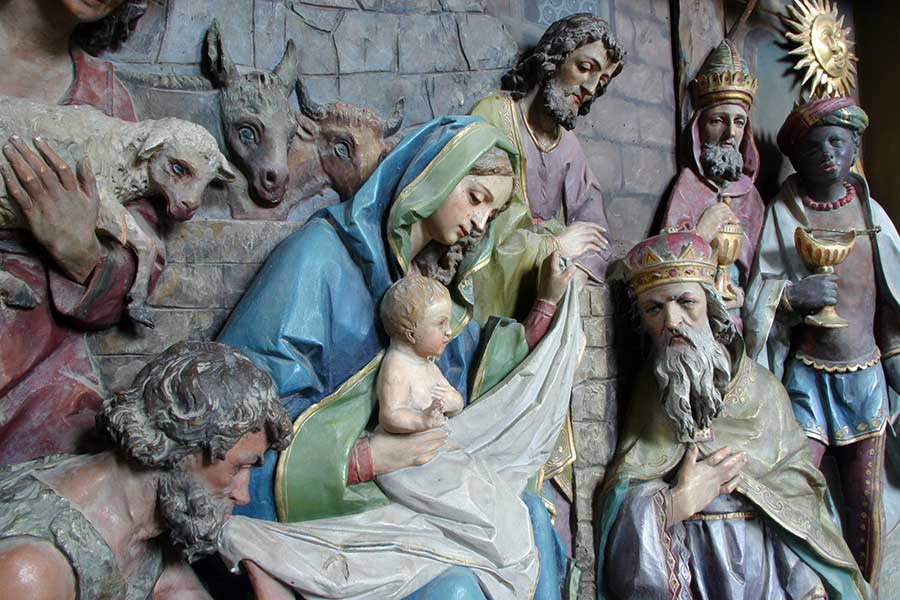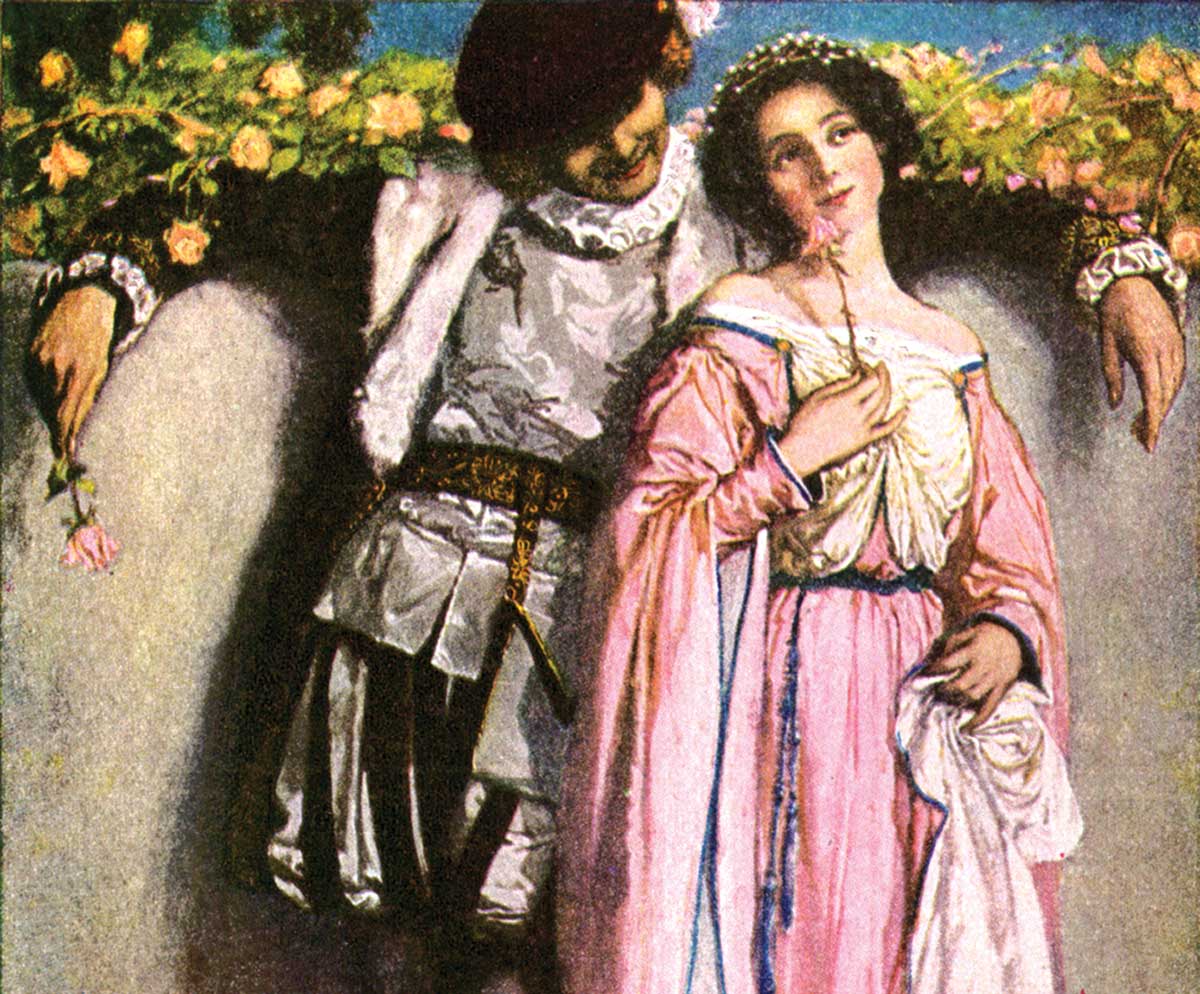Mitzvah Envy
by Richard J. Mammana, Jr.
Today is the fifth day of the Feast of Tabernacles, known to modern Jews as Sukkot. A group of young Orthodox Jewish men—of the Lubavitcher sect—wait at the Columbia University gate, beckoning Jews, both observant and not so, to spend a few moments in their portable booth, to bless the citron, palm, myrtle, and willow branches offered inside. Men among the passersby will also be invited to put on tefillin, to say blessings, and to thereby hasten the coming of the Messiah.
A student stops in every four or five minutes, keeping all the Lubavitchers busy. When one isn’t occupied, he passes out leaflets about their late rebbe, Menachem Mendel Schneerson, whom some of them believe to be the Messiah and for whose imminent return they wait. All the while, klezmer music booms from speakers mounted on the pickup truck that serves as the base for the booth. It sounds pretty good, and mitzvahs are mounting by the minute: Columbia’s shul on the street is a decided success.
Six young Franciscans stand at the gate to Columbia’s campus, clad in their habits. A pickup truck sits on the street nearby, with a confessional mounted on the bed and a set of wooden steps leading up to the open tailgate. A priest inside waits to give spiritual counsel and absolution to any students who may wish them. The friars invite passersby to spend a few minutes on a decade of the rosary.
One friar passes out invitations to a student prayer service to be held that evening. All the while, an alternation of Palestrina and praise songs wafts from a set of speakers unfortunately close to the confessional. A temporary church on the corner is doing its work to spread the Good News of Christ at the gates of Columbia University.
The Difference
What is the difference between these two events? The first is actually happening outside my window right now; the second probably never will. This has occasioned a serious case of mitzvah-envy in me.
The fact is that Columbia University, like the rest of New York City, is a place where Jews are serious about their faith and its practice, and not afraid to defend and to persevere in it either. Christians, on the other hand, are remarkably timid about admitting their faith, let alone proclaiming it verbally.
The people of God’s covenant with Abraham reaffirm their identity every day. It’s something I admire very much; it’s something from which I draw strength, and by which I think God is glorified. Peter Kreeft’s Ecumenical Jihad makes a convincing case for serious alliance and mutual encouragement of classical Christians and observant Jews in opposition to the secularism that is our common enemy, and the enemy of mankind. There are certainly elements of one here. Columbia is a healthier and holier place for both communities and their witness.
But if we do battle the same secular gods, there is a twinge of a double standard in the university, to say the least. It’s cool to be Jewish. Yarmulkes in class are not only expected, but accepted, yet a crucifix around the neck, a Bible on the desk, or a rosary in the belt is definitely not expected, let alone accepted. On the contrary, the response is more likely to be disgust or loss of intellectual respect.
The yarmulke in class leaves no doubt that its wearer is one of God’s Chosen People, on whom he has put his mark, and from whom all salvation comes. For girls, a good clue on Jewishness is the modest long black skirt many wear. The 15-foot-tall menorah on college walk during Hanukkah, or those in innumerable students’ rooms, leave no doubt that the tradition of this people is alive and well and generally approved. And yet I have a feeling that a cross of the same dimensions during Holy Week would provoke a roar from the ACLU only somewhat quieter than the trumps of Armageddon.
There is no denying the visible vitality of Judaism on campus, or its status as religio licita. Nor is there any denying that serious Christianity mostly exists as it did under Constantine just after the Edict of Milan: we’re tolerated, but that’s about all. While classes are routinely cancelled on Jewish High Holy Days by professors who know that large numbers of students will not attend, no provision is made in the university calendar for Holy Week observances or for any number of other Christian holidays.
Fridays & Sundays
A purely cultural observance is widespread, though I have a feeling that even the vestiges of this do not exist for much of the (baptized) Christian student body. Friday evenings and Sunday mornings are a good way to gauge this.
On Fridays, throngs of students gather for Shabbat in various local synagogues, as well as in chaplaincy-organized activities. Later on in the evening, as the fraternities begin to fill up and some Gentiles return from movies, the Jewish students walk back from services, chatting on the streets, enjoying their friends, living yiddishkeit far away from home. On Sunday mornings, when with a small group of friends I leave my building to trudge on bus and subway to our Church of the Resurrection, the birds and taxi drivers are often our only company.
That picture isn’t quite complete; alone it would be misleading. The Roman Catholic campus ministry does have its weekly (and well-attended) community Mass on Sunday evenings, and various other Christian groups meet throughout the week, sponsoring activities, lectures, and services. But there is nothing so actively visible as the young, observant, Jewish population within the student body. The scandal of Christian disunity may have a lot to do with this, as may the lack of even purely ethnic or cultural cohesion among us.
Yet perhaps part of the Christian challenge and the Glorious Battle is living in a world where one doesn’t always know what one’s neighbor believes or practices, whether he has been baptized and born into life anew, or whether he still wears the Old Adam. C. S. Lewis wrote in The Great Divorce of people becoming after they died what they actually were in life on Earth—the essence of their souls was made visible.
But on this side of the veil we Christians don’t know what those around us believe save by their words and deeds, nor can we know what gods or God they serve. So we have enlisted in a partly invisible army, cooperating in at least some way with those more visible soldiers of the older Covenant for the glory and honor of its God.
But wouldn’t it be nice, after all, if it were observant Christians who wore yarmulkes? And wouldn’t it be heartening if we had so signal a sign as the yarmulke to proclaim silently our life in the Pierced and Risen One?
Columbia, at least, would be a different place indeed if we did.
subscription options
Order
Print/Online Subscription

Get six issues (one year) of Touchstone PLUS full online access including pdf downloads for only $39.95. That's only $3.34 per month!
Order
Online Only
Subscription

Get a one-year full-access subscription to the Touchstone online archives for only $19.95. That's only $1.66 per month!
bulk subscriptions
Order Touchstone subscriptions in bulk and save $10 per sub! Each subscription includes 6 issues of Touchstone plus full online access to touchstonemag.com—including archives, videos, and pdf downloads of recent issues for only $29.95 each! Great for churches or study groups.
Transactions will be processed on a secure server.
more from the online archives
calling all readers
Please Donate
"There are magazines worth reading but few worth saving . . . Touchstone is just such a magazine."
—Alice von Hildebrand
"Here we do not concede one square millimeter of territory to falsehood, folly, contemporary sentimentality, or fashion. We speak the truth, and let God be our judge. . . . Touchstone is the one committedly Christian conservative journal."
—Anthony Esolen, Touchstone senior editor









